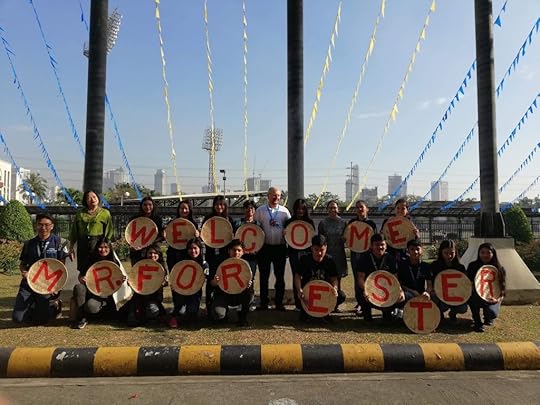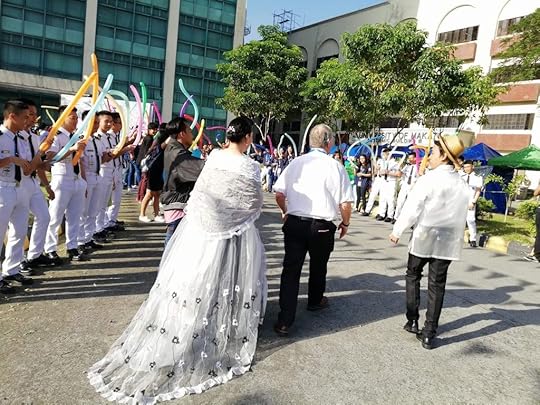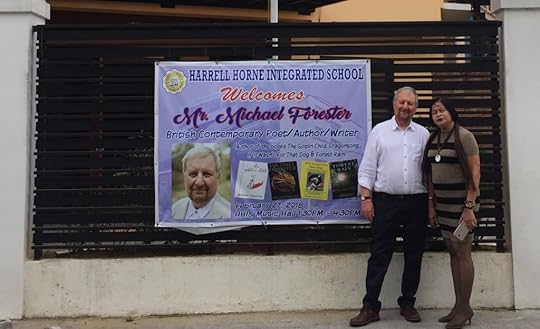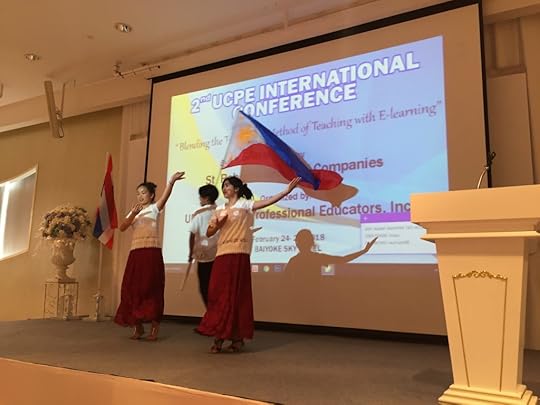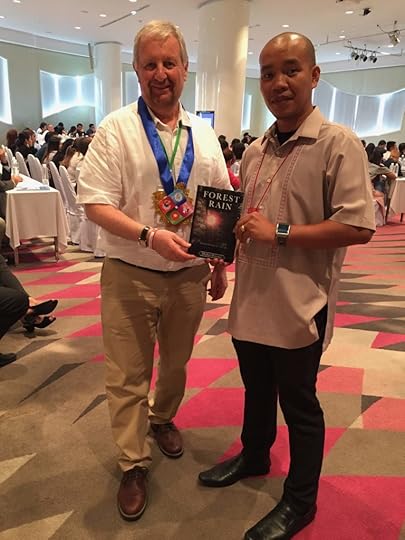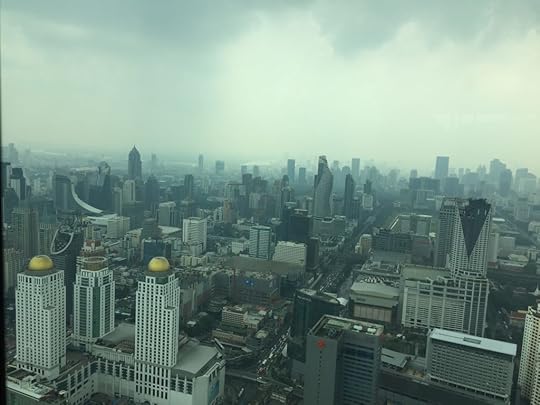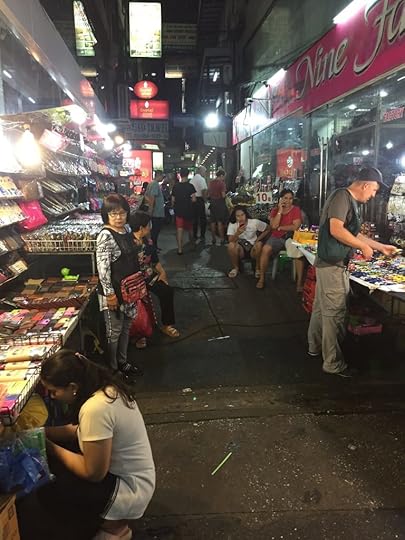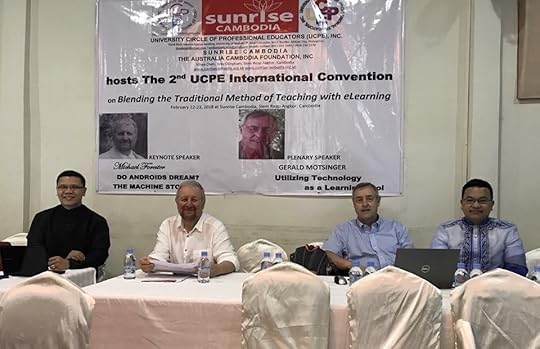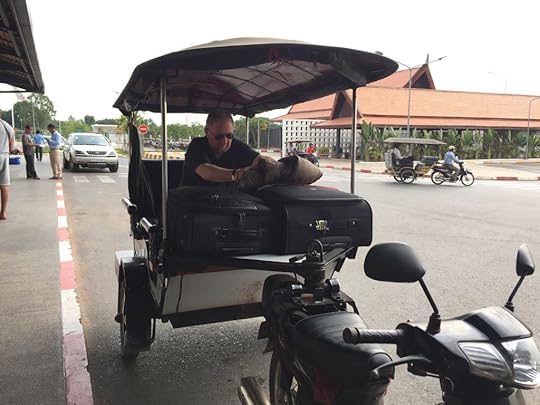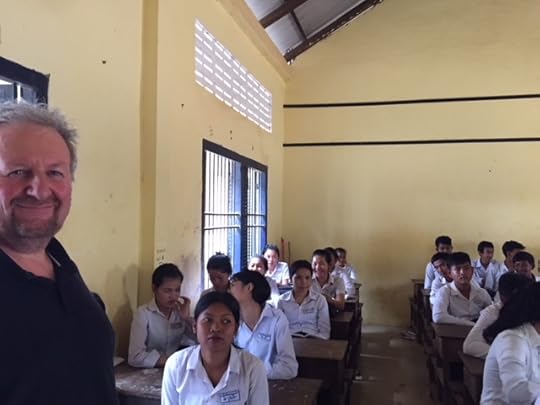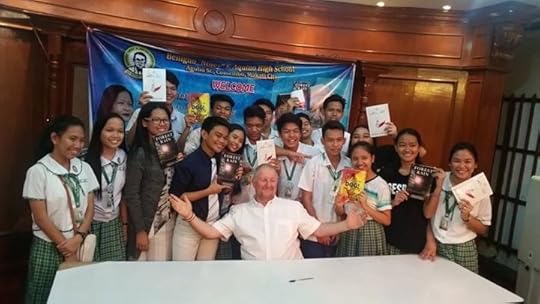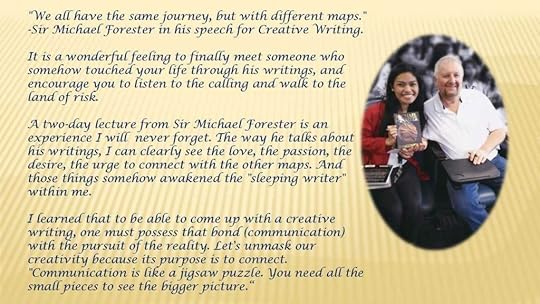Michael Forester's Blog, page 2
March 2, 2018
Forester in Asia 2018: Post 5: UMAK
Days 9-10: 28th -1st March 2018: University of Makati (UMAK)
We set out for an early start at Makati University, but are asked to delay our arrival. I have no idea why. “They’re not ready yet,” I’m told. Here, I am to run two back-to-back presentations of about two hours each. I will then repeat the whole thing the next day. On both days, the first presentation will be ‘A Journey to the Land of Risk,’ a repeat of my main presentation from last year, for audiences who have not heard me speak before. The second presentation will be the all-new, ‘The Story that Changes Your Future,’ as yet untested on a live audience.
As the car pulls up at the entrance, the reason for the delay becomes clear. The welcome is nothing short of tumultuous. As I exit, I am taken in arm by a young lady and young gentleman in traditional Filipino costume. They escort me towards the door to the sound of a brass band and a large group, cheering and waving. Around twenty or so students hold up placards that spell out ‘Welcome Mr Forester.’ As I move forward party poppers explode, releasing a storm of coloured confetti. UMAK appears pleased to see me again. I’m observant like that 
February 28, 2018
Forester in Asia 2018: Post 4
Forester in Asia 2018: Days 7-8: 26th -27th February 2018: Manila Bound
In the morning I am up at 4.00 am for departure to Suvarnabhumi
airport. The night market is still in full swing, though the street food vendors seem to have packed up and gone home. Eat your heart out New York. As the city that never sleeps, you ain’t got nothing on this.
Check-in is uneventful, though the lines through passport control are long. I understand why it takes a long while to get into a country, but why does it take a long time to get out? I use the flight to write my blog.
Arrival in Manila rekindles a pocketful of memories (with due deference to Paul Simon) of this city of skyscrapers, which is rising so fast. If you’re looking for somewhere to invest long term, with a population of almost 100 million, 40% of which is still at school, the Philippines offers opportunity. And yes, the brand identities we see from the car attest to the foreign money that is pouring in. Whether it is more to the benefit of Filipinos or outside investors, remains to be proven. I hope it is win-win. I am accommodated on the 16th floor of a tower block in Teguig. Tomorrow the tour proper starts.
The next day starts at a leisurely pace, due to the fact that the day’s presentation begins at 1.00pm. I am intrigued to discover that I am living on a virtual building site, my tower block being the only one of [it appears] 5 on the complex that is complete. All around me is raw concrete, glass awaiting installation and dust, so much dust. The few remaining slums I can see from my window are apparently being cleared rapidly to make way for the tower block. My tower has forty floors and I count twenty-four apartments on each floor. ‘Do the math,’ as my American friends would say. Slum clearance, in principle is good. But I can’t help wondering who affords the new apartments. By UK standards, they are inexpensive; by local, hugely expensive, and rising in price every year. I surmise again, that much investment is likely to be foreign, and wonder once more what the balance of benefit is, between locals and foreigners.
I hit the Starbucks downstairs (true civilisation, of course, existing only where there is Costa Coffee J) and note with interest that the cost of a branded coffee is similar to the price in the UK. Given that UK GDP is some 13 times that of the Philippines, the cost of service coffee is astronomic in local terms. Yes, ok, we must allow for the fact that income is much higher in Manila than rural Philippines. But nevertheless, it remains more than intriguing that pretty much every street corner seems to have a US-branded, or imitation, fast food outlet. Western brands are ubiquitous, enticing people to ‘live the dream.’ On the street I observe that Filipinos are gaining weight from the influx of high processed, high sugar, high fat food. Who gains financially though? I’d like to think there is win-win going on here, but I’m uneasy at the possible exploitation of dreams. Modernisation, even when externally financed, bring benefits, for sure. But the benefit comes at a price. Will Filipinos still feel positive about this journey they are making in one, or two generations’ time? I hope so. I do not anticipate living long enough to find out.
Today we are visiting Harrell Horne Integrated (high) School. I arrive to see a large poster announcing my impending arrival. Its message has been well noted. For, as we enter the school, the children we pass recognise me. Despite deafness, I can tell the name ‘Michael Forester’ is buzzing around in hushed tones. There are shy glances, hands proffered for shaking and photo requests, even before we have been formally admitted. Heady stuff. I redouble my commitment to keeping my feet on the ground.
This, it turns out, is ‘Literature Week’ at Harrell. I am informed I will be co-presenting with the high-profile Filipino film director, Baby Nebrida. Baby and I have opportunity to talk at some length before the afternoon’s event kicks off and we discover considerable creative common ground. I am already looking forward to seeing her new movie, Across The Crescent Moon (http://www.imdb.com/title/tt6459230/ ), for Baby has offered me a subtitled copy.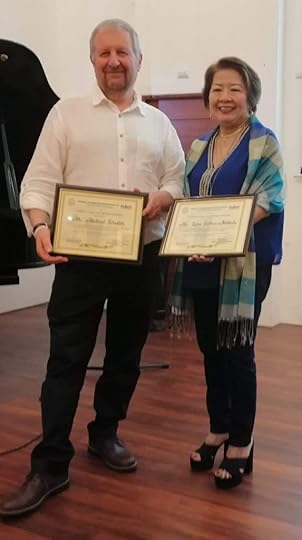
We enter the lecture theatre to a crowd of two hundred, or so. Formal introductions over, I launch into the high school version of ‘A Journey to the Land of Risk.’ It’s a metaphorical exploration of the taking of creative risk to ‘release the poet within,’ whatever form, words or otherwise, that the poetry takes.
And yes, it’s right on the button. There is a huge response and extensive questions afterwards. The most memorable is, ‘What motivates you to write poetry?’ I love this question. My answer is a single word: ‘Passion.’ Passion in all its forms moves me to write poetry, and will no doubt so motivate me to do so while I am in the Philippines, for I can feel the words beginning to bubble up. We then we explore the power of emotion, be it love, anger, pain or indignation, and its power to drive the inner Creative in us.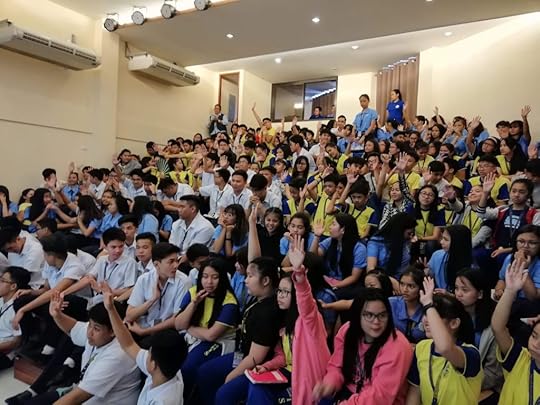
The queue for book-buying, signing and photo-taking stretches right across the theatre and back again. Book-signing and photos complete, we depart some five hours later, after what can only be described as an outstandingly successful event, organised, once again, by my tireless tour manager, Dr Janet Pascual of Makati University. Without her, none of this, absolutely none of it, would be happening. Namaste, Dr Pascual, I thank you, and acknowledge that in you which is eternal.
As we exit, I receive a text from home. It’s from my electricity company: “We are expecting bad weather this week, and you are registered for our priority service…” (that’s due to disability). I know already that ‘bad weather’ actually means -70 C. I smile wryly as I step out into the 300 haze.
Forest Rain
Spiritual Learnings for A New Age
These meditations focussed on key staging posts we all pass through on life’s journey,
will move you to joy; they will move you to tears.
They will help you give yourself permission to uncover
the depth of learning that is already inside yourself.
Buy a signed paperback of Forest Rain at: http://tiny.cc/ifl7qy
Buy a Kindle copy of Forest Rain at: http://tiny.cc/adl7qy
The post Forester in Asia 2018: Post 4 appeared first on Michael Forester.
February 26, 2018
Forester in Asia 2018: Post 3
Forester in Asia 2018: Days 5-6: 24th -25th February 2018: UCPE Conference Bangkok.
Arrival in Bangkok in darkness on this, my first visit to the city, discloses that they drive on the sensible side of the road, the motorway into the city is as straight as a laser beam and that taxis charge considerably less than they do in London. On the journey into the city, my mind drifts back to the old Tim Rice- Bjoern Ulvaeus musica,l Chess:
One night in Bangkok makes a hard man humble
Not much between despair and ecstasy
One night in Bangkok and the tough guys tumble
Can’t be too careful with your company
I can feel an angel sliding up to me
I’ve never considered myself a hard man, but humility takes attention to maintain when you are the centre of attention. And as for dryads and angels, I feel them with me all the time. Bangkok and I might yet become good friends.
The conference the next day is a more ordered affair of the kind I am used to, hosted on the 19th floor of the Baiyoke Sky Hotel, the tallest hotel in South East Asia. In the manner I am now familiar with, the conference commences with a doxology and both the Filipino and Thai national anthems. Pride in national identity is something I noticed on my last visit – a trait that is not nearly so well developed amongst my own countrymen and women. We would do well to learn some of the habits of discipline that are commonplace here.
For the second time I deliver ‘Do Androids Dream,’ an exploration of how, in a world of unstoppable technological advancement, we fail if we teach only knowledge and skills, for they become rapidly redundant. To preserve our ability to stay ahead of the machines, we must increase focus on teaching at the level of values – curiosity, flexibility, open-mindedness. I wrote the speech in December 2017. At Davos in January 2018, I noticed that Jack Ma, of Alibaba fame, covered similar ground. Who showed him my notes, I wonder? I must ask him next time I see him. Whilst the conference is well organised and at a sophisticated technological level, once again my slides do not come up in the right order. Perhaps we have a little more time yet before the machines take over.
It is obvious at coffee break that the speech has gone down well. There is much shaking of my hand and many requests to sign books, accompanied by the inevitable photo-calls I have become familiar with in Asia. Lunch is hosted on the 78th floor restaurant, which offers breath-taking views of the city. It consists of an international buffet, almost the largest I have ever seen (The Christmas buffet at Raffles hotel in Singapore still pips it to first prize, though). Intriguingly, there is virtually nothing on offer for vegetarians though. I console myself with the reminder that my body can hardly be said to be in need of food anyway.
In the evening I am reunited with my coat (including the essential batteries) by my friend, Ony, who has taken it into custody during our enforced separation. It shows no sign of having missed me. Perhaps it has bonded with her now instead. That’s ok. It is leather and I will have to divorce it soon anyway. A picture from home, which is now shivering at minus 70 C, confirms that someone I care about has not forgotten his coat.
The next day, Sunday, is a day at leisure in Bangkok. I decide on a river tour as the best way of taking in the feel of the city. I catch sight of the Royal Palace. Thais hold their royal family in enormously high esteem – a sense of value that I admire, which we have not sustained to quite the same extent in the UK. On the riverbank, modern towers of commerce and domestic living share the space with Buddhist and Chinese temples and mosques. Also in evidence are a surprising number of plots at the shantytown level. New money is driving out old poverty, but has yet to complete the job thoroughly.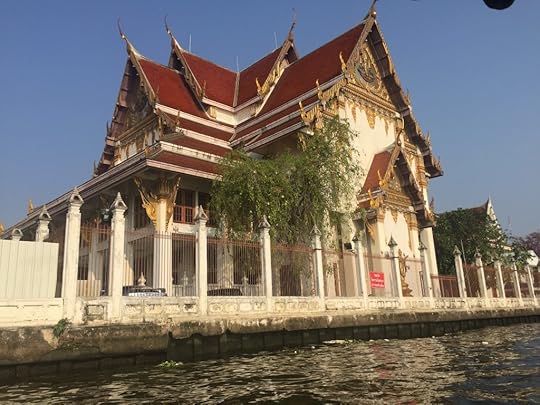
Shopping in the unending street-markets follows. As evening falls more street vendors appear. I am offered long skewers of prawns and Thai soup from large metal pots. It’s like an enormous street party.
The evening reveals that no accommodation has been booked for me in Manila, just twenty four hours away from being needed. I raise my eyebrows at the just-in-time approach I see so much of here. It’s challenging for me, but clearly works for my hosts. Not to worry. I reach for my i-phone and am grateful I have at least mastered the technology of AirBnB. Sleeping space secured, I am about to turn in for the evening when I am informed that a few additional bookings have been made on my Filipino tour. No problem. I was expecting that. “How many events do we have now?” I ask naively. It’s a twenty-one day tour, including travel days and rest days. “Twenty-seven,” comes the answer.
The post Forester in Asia 2018: Post 3 appeared first on Michael Forester.
February 24, 2018
Forester in Asia: Post 2
Days 3-4: 22nd – 23rd February 2018: UCPE Conference at Sunrise.
To be clear, the conference is at Sunrise Cambodia, the charitable school foundation (http://newhopecambodia.com/), not Sunrise as in time!
UCPE (the University Circle of Professional Educators) is mounting a conference for educators here as a combined educational and fundraising event. I am to deliver two keynote speeches here on consecutive days, before we move on to a larger and more sophisticated version of the same event in Bangkok. But here in Siem Reap, the infrastructure is inevitably more basic, with repeated power breakdowns and more constrained physical resources for conference delivery. It matters not one iota to me. I will offer the message I have bring to whoever wants to listen, wherever that takes me.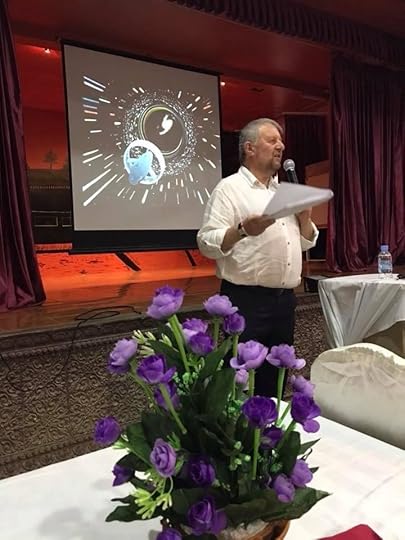
But whilst the physical limitations are no issue, the English language capability is much harder to deal with. We try working with an interpreter, but give up part way through the presentation. My talk, entitled ‘Do Androids Dream,’ explores the challenges of skill transfer in a world that makes knowledge redundant almost as fast as it is learned. But this is not an easy concept to convey in translation, and I have pitched the level of the speech based on my experiences in the Philippines last year. Bad mistake. The talk misses the mark. Other speakers, whose focus is much more on practical teaching resources and how to access them, have an offering that is much more obviously relevant to teachers in the Siem Reap of 2018.
Come the night, sleep eludes me for reason of jet lag. I manage about two hours, adding to the effect of sleepless on the journey from the UK itself. At this stage all I can do is hope I can sustain, for I seek to make up by energetic delivery what is lacking in comprehension of content.
By day two I am concerned that the second speech will go the same way. ‘The Machine Stops’ (the title, of course, having been borrowed from E M Forster’s short story of 1909), is actually a metaphorical exploration of what happens when a society obsesses with technology. The key phrase in the speech ‘To Learn, To Love and To Grow,’ is immediately latched onto as a key focus for the educational process in which these folk are involved. At coffee break much appreciation is expressed, many books are bought and signed (intriguingly, mostly ‘A Home For Other Gods’) and many photos taken. I am relieved that this time I have it right. What accounts for the difference is impossible to say. “We does what we cans,” as the BFG so eloquently put it.
The conference is brought to an early close at 2.00pm, as we have a flight to catch to Bangkok; but not before a major exercise in certificate presentation to much applause and more picture-taking has been navigated. I have learned to hold a smile, unbroken for a full fifteen minutes now. Is this, I wonder, an authorship skill?
More tuk-tuks are summoned and we depart for the flight. As the wind flows past me, I observe the enormous numbers of hotels that line the main highway out to the airport, completed, under construction, or announced on billboard. On the road, though cars are well in evidence, the motorbikes and tuk-tuks comprise maybe 80% of the traffic. With the immense pace of economic growth in evidence, I am wondering how long it will be before four-wheeled vehicles are in the majority, and before private drivers outnumber tut-tuks. By that time these folk will no doubt have increased their income, both nationally and individually. But if care is not taken, Siem Reap will go the traffic-jam-infested, fumed-choked way of so many other Asian cities. Yet I observe that virtually all road users are respectful of the 40kph speed limit. This bodes well for a sensible approach to road use. The future actually looks quite promising for Cambodia. I very much hope that I will be able to return for a longer visit. There is something soft, something warm and inviting in the spirit of this people. I would like to know more of them and their national journey.
At check-in, I realise with a jolt that I have left my coat at the hotel. Worse still, the coat contains my spare batteries for my cochlear implant without which I will be close to profound deafness. I’ve told myself before, I must never forget I am deaf – the implications, particularly in a foreign country, can be devastating when the technology cuts out for lack of power. I’ve told myself a dozen times, a hundred times, but I obviously do not listen. I look sheepishly at my companions, Dr Pascual and Gerry Motsinger, who make phone calls and send Messenger messages. Soon the problem is resolved. Others in the party following on a later flight will bring the coat and its content to Bangkok. Through in the departure lounge I find Costa Coffee. In a John Wesley moment, my heart is strangely warmed at this sight from home. Naturally, I avail myself of its offering. Despite my one-man attempts at self-sabotage, the tour is going well.
The post Forester in Asia: Post 2 appeared first on Michael Forester.
February 22, 2018
Forester in Asia: Post 1
Forester in Asia: Day 0: 19th February 2018: I’m Leaving on a Jet Plane
He’s lying on my bed looking doleful. He’s not been willing let me venture more than three metres away from him for the last two days. Preparations for this trip started six months or more ago, but he’s not to know that. He can’t tell what I’m doing when I’m seated at my desk, e-mailing travel arrangements to the other side of the world and back. When he doesn’t know what’s about to happen, he’s content just to lie at my feet during the day, mug me for after dinner Bonios and carrots in the early evening, and nag me to go to bed at 8.00pm, when he reckons all respectable creatures should be sleeping. But two days ago, when the big black suitcase came down from the hall cupboard and I started filling it with shirts and socks and meds and papers and sunglasses, that’s when he knew I was going away. I found myself whistling the old John Denver tune. ‘Leaving on a Jet Plane.’ How am I supposed to tell my best friend I’ll be away for four weeks and back in time for his fifteenth birthday, when my best friend doesn’t speak English? His languages are body movement and eye contact, licks and cuddles, love and sadness and he speaks volumes in those. But understanding the meaning of twenty-eight tomorrows? That is a very different matter.
Last August, when I confirmed I would be revisiting South East Asia, I wasn’t even sure he would make it through this winter up to my departure date. But he’s proved more resilient that I gave him cred for. Now I’m confident that he will still be here when I get back. And that aught to mean I have him for the summer too. Next winter? Well, sufficient unto the day is the evil thereof.
It was in August 2017 that I had accepted the invitation from the University Circle of Professional Educators to deliver keynote speeches to their back-to-back conferences in Siem Reap and Bangkok, and then to fly on to Manila to spend three weeks in the Philippines, where I had been given such a rapturous welcome last year. But at the same time I also requested to postpone a similar invitation to speak in Washington and Chicago until 2019. I love this wonderful work. But each day away brings us closer to my boy’s final departure day, when he will check in his luggage and climb the metaphorical aircraft steps for a flight from which he will not return. But 2019? Sufficient unto the day…
So here I am, all but fully packed and a little ahead of schedule, giving me a free hour to pen what I anticipate will be the first few lines of another travel log of another odyssey. But I am no king of Ithaca, and at this stage of the trip my mind is filled with singularly un-regal uncertainty. I cast back to the invitation (“Two conferences? Two speeches at each? What, I find myself wondering, is my relevance to an educators’ conference at which every other delegate seems to be a PhD who has already published a dozen respected academic papers? And that to be followed by another dozen or so further university and school presentations in the Philippines to follow?). I dismiss the questions unanswered and address myself to the preparation of speeches (there will be numerous audiences who listened to me last year. So, that means whole new presentations, with new material, then); to the practicing of deliveries (so much of the power of what we say lies not in the words, but how you speak the words and the body language you use while doing so); and to the impromptu master classes that I know will be requested as often on this visit as they were last time. Last year I became adept at walking into a lecture theatre with no idea of what I was going to say, then delivering a two hour interactive lecture on ‘What is creativity?’ or ‘Beauty in literature.’ And always, always the underlying question, sometimes actually spoken by a member of the audience, sometimes only implied: ‘How do we get to do what you do?’
My answer was always much the same: ‘You must learn to open yourself to the silence. You must develop the discipline to turn off the noise and learn to recognise the awareness that is already there inside; to permit that which is yearning, in deep groans of the silence, calling to you to allow it to come out. And you have to trust it enough not to question it.’ This has taken me a lifetime to learn. This is what the journey, thus far, has been about. It is a journey that will be shared in their turn by some of these dear ones, who want to walk the same path. It is the long, winding road in the direction of enlightenment. There will be many miles to travel on this path, with much dust billowing about us as we do. It will take many lifetimes to do it.
But for now, my own path leads to Seam Reap, Bangkok where my talks are entitled ‘Do Androids Dream?’ and ‘The Machine Stops.’ Both will be innovative to the academic ear – both offer the chance to be ko-ans to minds honed only for critical evaluation. And then conferences will be over, and in the care of my indefatigable tour manager, Professor Pasqual of Makati University, I will move on to the Philippines, Manila, Camerines Sur, Ifuago and other places yet to be specified where I shall give vice to a new presentation: ‘The Story that Changes Your Future’ for the first time. As soon as I announced that title I caused a flurry of excited questions as to what it covers. And now I wait with fascination to watch the changes to futures that follow, at least for those who are ready for change. ‘He that has ears to hear: let him hear,’ For like the master teacher who came before me, whom I see and write k to emulate however imperfectly, I speak mostly in metaphor. Not all are yet ready for it. Not all yet have ears to hear.
But before all that, tomorrow, just before 7.00 am, I shall be listening out, with John Denver on my mind, for ‘the taxi, who is waiting and blowing his horn, already I’m so lonesome I could cry…’
And Matt? He will look at me dolefully again, asking with only his eyes how it is I can leave him. Twenty-eight tomorrows are twenty-eight too many, when you’re almost fifteen years old and your legs ache from arthritis. But in the care of his mum who loves him like I do, he will remain safe, and lovingly over-fed on carrots and Bonios. He’ll think of me seldom. I shall be looking forward to returning from the moment I leave.
But it doesn’t end there. For, when all the cases stand ready in the hall, and I’m preparing for my last night at home, Dr Pasqual messages. Will I fit in one more talk on arrival, at Sunrise? That’s Sunrise the school, not sunrise the time , you understand. But it might as well be the time, as I shall be whisked from the airport to stat speaking an hour and a half after I touch down. I giggle and agree. This is what I love so much about visiting my friends in South East Asia – the unexpected.
Forester in Asia: Days 1-2: 20th-21st February 2018: Arrival at Sunrise
After an uneventful twenty-three hours of travel I arrive at Seam Reap airport and exit the aircraft to be confronted by the wall of humidity that I am so familiar with in this part of the world. Passing equally uneventfully through passport control and collecting my luggage (yes, all of it has arrived at the destination on the same flight as me – oh ye of little faith), I exit the terminal into a country I have never visited before. A tuk-tuk is summoned, my first journey in one. I demand a photo with the driver and then we proceed, me clicking my camera at the new sights that are inescapably reminiscent of my visit to Chiang Mai, Thailand, eighteen months back. The roads are emptier but the architecture similar. Buddhist temples adorned with gold rush past. Pagodas and spirit houses jostle cheek-by-jowl with modern hotels, for Cambodia is investing much in attracting tourism. I hope they are careful to preserve their culture as they throw themselves headlong into enticing tourist dollars into their land.
My knowledge of this country is out-dated. I have paid it inadequate attention to it since the 1970s and the vile era of Pol Pot and the Khmer Rouge. I shudder at the memory of the indescribable depths of evil of which the human soul, at least some human souls, are capable of descending. But recovery and economic growth are all about me, with much modernisation in evidence, in the form of modern hospitals, hotels and so on. I take note as we a pass a building site in the early stage of constructing a western style shopping mall, hoping fervently that it does not become filled western junk food outlets such as seem to stand for progress elsewhere I have visited in South East Asia. I rather think I hope in vain.
A brief stop to drop bags at the hotel is followed by an immediate departure for the Sunrise Foundation, an Australian-originated educational charity. In Cambodia the authorities provide the land for schooling, but the building and running of schools have to be privately financed. We meet with the Vice-principal and other leaders of the school, and I note that here, too, building is rapidly advancing. Though present capacity is largely limited to tin-roofed, single story teaching blocks with open doorways and unglazed windows, it is evident that soon there will be a fine complex of new, multiple-storey buildings on this site, serving the needs of generations of school children to come.
I am introduced to a classroom of forty or so white-shirted teenagers. I have had no time to prepare new material and am unsure of how good their English actually is. Limited westerner that I am, I speak only English and my verbal communication fails when others do not. I make the excuse that I cannot hear much in English, so other languages would be next to impossible. But I know in my heart that it would be little different if I could hear. Thus, I proceed through an adjusted version of ‘A Journey to the Land of Risk,’ that I developed last year for schools in the Philippines. I hope I am making up in movement and body language some of what may be missing in understanding of the words. I know much of the value of the visit lies in the fact that westerners actually take the trouble to visit. I reflect on the universal reality that t is primarily by our presence, eye contact and body language, that we convey to people that we value them. Words come a poor second anyway.
Yet as the words pour forth, I take a little comfort that others gather spontaneously at the doorway to swell the audience. I take that to imply I’m saying something worth listening to. I could be wrong though. It might be simply that they want to view the spectacle of a jet-lagged, bedraggled Brit making an idiot of himself. We do well not to think of ourselves too highly. Let others urge us up higher at the feast if it is our place so to be lifted. We shall remain at the lowly end of the table until called higher by the master of the feast.
Soon we are done and ready to leave. Later, the photos tell me just how dishevelled I looked, leaving me wondering exactly when the last time was that I had looked into a mirror. My excuse was I had come directly from the flight. So maybe I was right then. The attraction was indeed more in watching the unruly-haired Brit perform, than it was in what he had to say.
I remain hopeful that in some, some of the words of metaphor will sink in. And where the seed falls, later so will rain, and sunshine will follow. Perhaps there will yet be a wheat field, resplendent with corn.
He that has ears to hear, let him hear.
Namaste.
The post Forester in Asia: Post 1 appeared first on Michael Forester.
February 15, 2018
Book Review: Charles Bukowski – Storm for the Living and the Dead
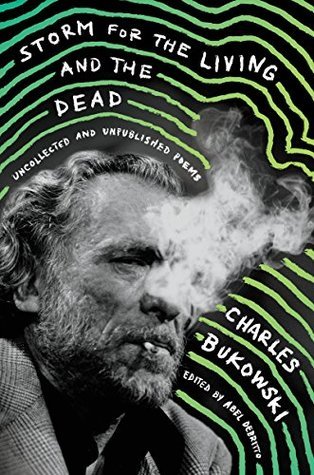
Yet another astonishing collection from the king of abrasion.
Charles Bukowski spares no one – especially himself – in his trademark honesty. Reading Bukowski feels like rubbing my ego with 40 grit sandpaper. Yet his volumes of poetry – and this is no exception – are compulsive page turners. He remains the only poet whose books I read cover to cover, in order, and sometimes at a single sitting. Brilliant writing. Recommended without reservation.
The post Book Review: Charles Bukowski – Storm for the Living and the Dead appeared first on Michael Forester.
February 6, 2018
The Writer
I have been asked to post more poetry.
I wrote this piece in March 2001 for and about a Pulitzer prize-winning author who was kind enough to take an interest in my early work. I had no way of knowing that just six months after its completion, the prophecy contained in the poem would reach a devastating fulfilment.
The piece is called:
The Writer
Tortured soul;
battering his storm-tossed hull
on rocks of self effacement
and coral reefs
of critical acclaim.
Watch now, as microscopic minds
seek to seize the vessel’s wheel
and steer his ship
to calmer pools, inconsequent,
where skeletal remains of once proud men o’ war
now atrophy
and drip demented lunacy
into the voracious sea
of popular fiction.
His calling is not so.
For though he too has risen,
hand in hand with Satan,
to heights where Jordan rises,
and there to spy the kingdoms of the earth,
now offered gaudy prizes
by screen play whores and plagiaristic pimps,
yet his soul remains and is not sold.
Though all within his flesh would sometimes yearn,
to worship recognition,
like wannabe Messiahs
to hour glass sands he yields not,
nor Jerry’s adulation
or Oprah’s chat show wolverines and hawks.
Exhausted, slumbering softly,
he dreams. And in his dream now,
the Prophet rises to Mount Sinai
where hidden inner voices,
inscribe upon stone tablets
the Truth that’s his and his alone to tell.
So here at midnight’s summons,
where sunlight fears to tamper,
he turns and tosses,
rests not,
and mocking, taunts his soul now
to rise again to twelfth draft eloquence
and holy grails of literary style.
Wrenched cold from sleep by demons
that scream and won’t be silenced
of end-time revelations
and Hell’s own fury loosed upon the earth,
thus now in inspiration
this visionary takes pen
and here draws Armageddon’s battle lines
on Macey’s cultured children
ignoring cardboard cities
while hurrying to soiries
or Broadway hack-hyped dross on opening nights.
Apocalyptic horseman,
thus heeds he now the calling,
and trumpets with considered eloquence,
Truth, riding milk-white steeds of hardback tomes.
And sears he now asunder
with caustic revelations
the vipers broods of pharisaic line.
One thought his mind possesses:
the Laws of Truth Incarnate
imparted unto him he must declare.
With God’s own Word possessed now,
descends he to the lowlands
of grey paved streets and bustling shopping malls.
But at the Prophet’s coming
affronted unto anger
his eyes are now alighting,
on golden calves of paper cover rights
and east coast movie tie ups
with t-shirt print promotions
that in the Prophet’s absence on the Mount
the people sank to worship,
in hungering and thirsting,
as Aaron’s children will do
For Egypt’s flesh and first born smitten sons.
And at such desecration,
The angry Prophet shudders
that none will heed the Most High, Truth declared.
Thus casts he now his tablets
Inscribed by God’s own finger
before the swine. They shatter
in righteous indignation
at Mammon’s here and now supremacy.
And in his moral outrage
he makes them drink the waters,
embittered, gold polluted
who would the transient worship
above eternal Truth and ecstasy.
But yet in deep compassion
for sheep without a shepherd,
though wearied now of soul he turns again,
to Mounts of Contemplation.
and from his inner vision
shall further revelations crafted be.
Now, as the lot of prophets
was ever thus before him,
his voice cries out within the wilderness,
of lonely first draft deserts,
insomniac awakenings,
and intermittent muse-sired words of grace,
while far below his Mountain
the Temple money changers
obsessed in trading trinkets
now shriek and scramble, bartering his stock.
(c) Michael Forester
March 2001
photo credit: CNN
The post The Writer appeared first on Michael Forester.
January 25, 2018
Michael Forester’s second book tour of Asia commences 21st February 2018
I am delighted to confirm details of my second Asian tour, 21st February – 19th March 2018. Travelling as a guest of the University Circle of Professional Educators (UCPE), the programme starts with two back-to-back conferences in Siem Reap and Bangkok, where I will be delivering keynote and plenary speeches on ‘Do Androids Dream’ (the impact and management of technology in the educational process) and ‘The Machine Stops’ (an exploration of the common ground between creativity and technology). From Bangkok we will travel on to The Philippines, for a multi-location three week tour delivering the ‘A Journey To The Land of Risk’ presentation that was so well received last year, and the all-new ‘The Story that Changes Your Future’ (an interactive discourse of how we can use the power of story telling and belief to change our lives).
I am hugely looking forward to renewing old friendships and forging new ones in the Philippines, together with meeting new friends in Cambodia and Thailand. Once again I am indebted to Professor Janet Pasqual, Chair of the UCPE and her team for making this visit possible. Full tour details available from Tenaj Lauqsal on Facebook.
25.01.2018
The post Michael Forester’s second book tour of Asia commences 21st February 2018 appeared first on Michael Forester.
December 14, 2017
Blogpost 107: Weeping in Ramah
Right lads. An absolute maximum of one flask of wine each or it becomes counter-productive. This is the final briefing. Pay attention. You will use the buddy system – WORK IN PAIRS. You will decide before you enter the dens which of you is the Guard and which is the Cutter.
1 Search the den thoroughly. Ensure you have identified everything.
2 Coral all the vermin in one place or you will not, repeat NOT be able to control them. To start with, the element of surprise is yours. Do not waste it.
3 It may sound obvious, but I will repeat it anyway. The Guard guards, the Cutter cuts.
Guards, do not forget: the females will become very, very aggressive once they realise you are after their pups. Do not get within arms’ length of them or THEY WILL HAVE YOU.
4 Cutters listen carefully and observe: Pick up the whelp in one hand by its feet like…. so. Strip off anything covering it like… so. Sex it and discard all females (and Claudius, if I catch you wasting time trying to fuck anything I WILL CUT IT OFF. We all remember you with that little bitch outside Jerusalem last month). Similarly, discard all males over about two years of age.
5 Draw your blade across the throat like… so, whilst twisting your holding arm towards your body like… so. As you will observe, using this method there is little resistance to the procedure. That is why it is the Approved Procedure. This is why we teach it to you in basic training.
6 Repeat the Approved Procedure for any other qualifying males, discard the corpses, then GET OUT QUICKLY.
Follow those orders meticulously and we’ll be out of Bethlehem by nightfall. And you will all be home with your wives and children before daybreak. Gods bless us all.
The post Blogpost 107: Weeping in Ramah appeared first on Michael Forester.
November 29, 2017
Blogpost 106: Review of ‘Salmon Fishing in the Yemen’ by Paul Torday
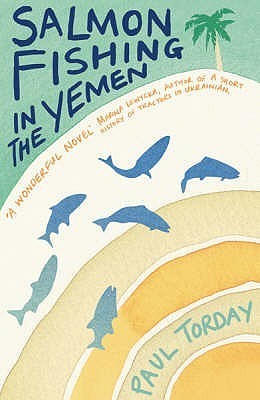 This book, first published in 2007 and made into a movie in 2011, finds new traction from the context of the appalling events taking place in the Yemen in 2017.
This book, first published in 2007 and made into a movie in 2011, finds new traction from the context of the appalling events taking place in the Yemen in 2017.
An innovative format of journal entries, interview records and newspaper articles, lends a freshness that maintains the momentum of the work, through a story line that might otherwise be as dry as a Yemeni summer. That the book kept my attention from start to finish is a testament to Paul Torday’s expertise in fisheries science and capability in story telling – an unusual combination and actually a rather more enticing one than would first be expected.
However, what the book gains in format, it risks losing in narrative drive. At numerous points in the story, the author slips into a more traditional mode of story telling, thus shaking the credibility of the unusual vehicles (interview records, diary entries etc.) employed. Through strength in form more than in characterisation, I did find the two or three central characters of the story credible, even though I could not say I grew to love any enough to care about what happens to them.
In my opinion, a single major structural fault drags the book down, in that the denouement focusses on a minor character, raised above his importance to the story by virtue of his political status. Perhaps this works better in the movie, which I have not seen. In the book it is not successfully carried off.
What leads me to rate this as 4 stars and not 3, is the later significant context of the Yemeni war, which could not have been foreseen when Mr Torday wrote the book. Because of it, ‘Salmon Fishing In the Yemen’ takes on a poignancy that I am more familiar with seeing in stories set just before one of the two world wars, where the characters do not know of the momentous events about to occur, whereas the reader does. In this book, the author is as ignorant of the destruction of the world he describes as are his characters. It therefore gives rise to much thought on the reader’s part as to the presumptions we make about how our personal worlds will develop, and about how wrong we can be.
Nevertheless, despite its weaknesses it’s a lightweight, enjoyable read – one for the bedside or air travel.
Michael Forester.co.uk
27.11.17
The post Blogpost 106: Review of ‘Salmon Fishing in the Yemen’ by Paul Torday appeared first on Michael Forester.

